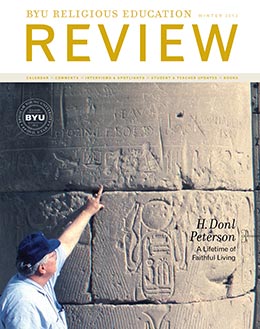Nyssa Silvester (nyssa.silvester@gmail.com) is a senior studying English at BYU.
For the past thirty years, BYU’s L. Tom Perry Special Collections has housed a torn half of a fifth-century papyrus, a commentary on Psalms 26–29. Though this document, known as the Didymus Papyrus, has gone virtually untouched for decades, its other half, located in Cologne, Germany, has received plenty of scholarly treatment. The contents of this second half of the papyrus were published in the 1970s, and scholars of the ancient world are now pressing for the publication of BYU’s half. Lincoln H. Blumell, assistant professor of ancient scripture at BYU, is currently taking on this project with funding from a Mentoring Environments Grant (MEG).
With money from the MEG, Blumell has hired two students to help prepare the papyrus for publication: Justin Barney, a graduate student in comparative studies with an emphasis in Greek studies, and Michael Trotter, a classical studies major. Over the next eighteen months, Blumell and his students will transcribe, translate, and edit the text of the Didymus Papyrus, write accompanying commentary, and submit the results for publication.
The Didymus Papyrus is the crown jewel of BYU’s Special Collections, says Blumell, and the project will provide Barney and Trotter with invaluable experience in classical studies. As they translate, they will deepen their knowledge of Greek philology and papyrology, preparing them for further academic work. In addition, Blumell plans to travel to Germany with Barney and Trotter to study the other half of the papyrus. They will be practicing codicology—in other words, they will study how the physical pieces of parchment fit together—to enhance their scholarship on the ancient document. With this knowledge, Blumell and his research assistants will be prepared to publish a landmark text in classical studies.
The publication of the Didymus Papyrus is just one example of the projects that students can work on because of MEGs and other university grants. Recently, for instance, Roger P. Minert, professor of Church history and doctrine at BYU, and his team of students finished compiling the testimonies and anecdotes of Latter-day Saints in East and West Germany during World War II. In addition, Thomas A. Wayment, professor of ancient scripture at BYU, frequently finds mentoring opportunities for students of ancient Near East studies; once he even traveled with students to Yale University to examine a fragment of a copy of the Acts of Paul.
Students can also propose their own research for grants through BYU’s Office of Research and Creative Activities (ORCA). During the fall, students can apply for ORCA grants of $1,500, which are awarded across all colleges of the university, including Religious Education. Among the ORCA-funded projects in Religious Education for 2012 were Mallory Hales Perry’s “The Church in Transition: A Letter from Joseph F. Smith to Susa Young Gates” and Elizabeth Montgomery’s “I’m Glad They Called Me on a Mission: What Young Adults Learn from Serving an LDS Mission.”
As students use grant money to research historical documents, analyze survey data, and translate ancient papyri, they expand their educations far beyond the boundaries of Provo, Utah. With mentoring from professors, students at BYU can accomplish real scholarly work that will prepare them for any career they might pursue.
